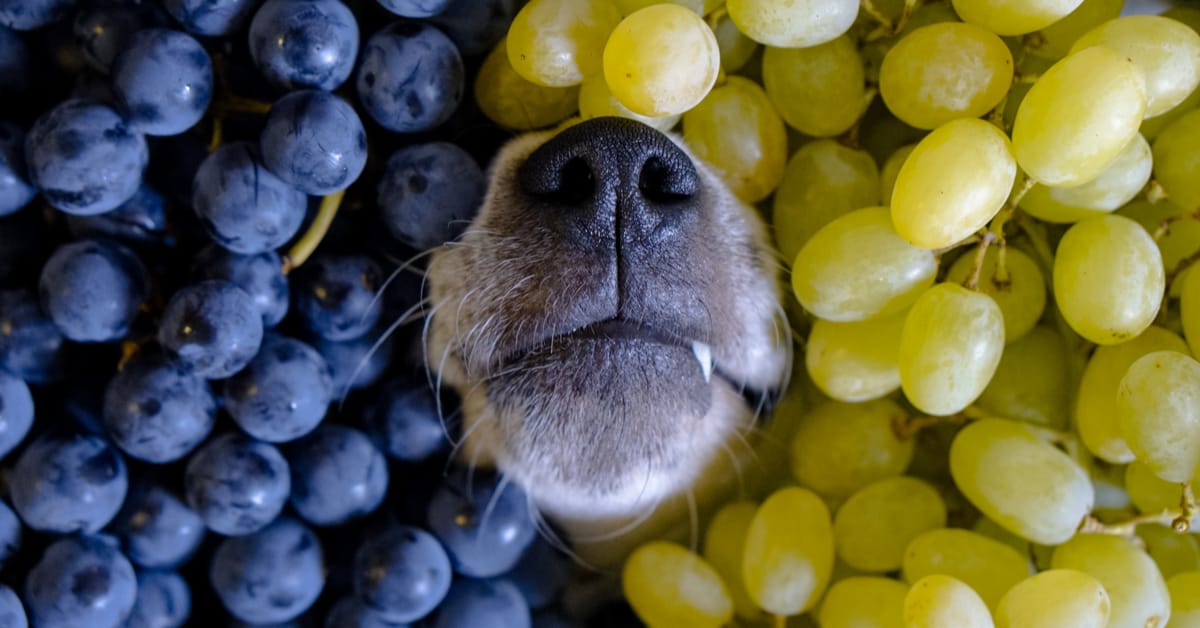If you’re a new dog owner, you need to know that you can’t just go around feeding your dogs whatever you want. There are tons of human foods that are bad for dogs that we eat every day. In fact, some of these foods can cause severe complications that could lead to fatal conditions.
And one of these foods is grapes.
Yes, you read that right. Grapes, a favorite snack and fruit for many humans, pose significant dangers for dogs. In fact, out of all the items in your kitchen, grapes might be one of the worst foods your dogs can get their hands on.
Why is that? Well, the answer is pretty complicated. So, in this article, we will try and make it a bit simpler for you.
So, what to do if your dog eats grapes and some signs that your dog has gotten into your fruit pantry.
What Makes Grapes Bad for Dogs?
Grape toxicity in dogs is a fairly complicated concept. In fact, scientists and researchers have yet to pinpoint what exact chemical or compound in grapes is dangerous for dogs. What they do know, however, is that there is something inside grapes that can damage their kidneys, which is why they are very dangerous for dogs.
While scientists aren’t sure what the exact toxic compound is in grapes, they do know that dogs cannot metabolize some of the monosaccharides, tannins, and flavonoids you can find in the fruit.
This could be seen as one of the primary reasons why grapes are dangerous for dogs, but scientists aren’t exactly sure just yet. But for now, all we know is that grapes can damage dogs’ kidneys and are best kept away from your pets.
Are Green Grapes Bad for Dogs Too?
The thing about grapes is that all types are toxic for dogs. Again, Spot and Tango explains why dogs can’t eat grapes and that scientists aren’t sure what makes them toxic. They have noticed that any type of grape can harm a dog’s kidney. Not only does this include green grapes, but it includes peeled grapes, frozen grapes, and even dried grapes.
On top of that, most grape-derived products like jams, juices, and jellies can be toxic for your dog, and you’re better off hiding them from your pooch.
Can Dogs Eat Raisins?
Since dogs need to stay away from just about any grape-derived product, raisins are also off-limits. Raisins can hurt a dog’s kidney in the same way as fresh grapes, so make sure not to feed them to your pet.
What to Do If Your Dog Eats Grapes
The thing about grapes is that scientists have a lot to learn about what they can do to dogs. Some foods are toxic to dogs and generally harmless in low doses, and you only need to worry if the dog eats a lot. But with grapes, just 0.3 ounces per pound of body weight can be dangerous for your dog.
This is why you should never let your dog eat grapes, even if they just eat a little bit.
online pharmacy buy furosemide best drugstore for you
If you see your dog eating grapes, you should first take them away from them. This means removing all the grapes from the area and trying to stop your dog from eating whatever is in its mouth.
From there, you need to call your vet. This is true even if your dog only eats a couple of grapes because grape poisoning is very serious. From there, your dog may provide you with some instructions. And sometimes, your vet may ask you to bring the dog to the clinic.
online pharmacy buy diflucan best drugstore for you
At the clinic, the vet may try to induce vomiting in your dog to make sure that they expel everything from their system. Sometimes, your vet won’t require you to bring your dog to the clinic, but if you notice your dog exhibiting trouble breathing and other concerning symptoms, give them a follow-up call.
Signs Your Dog Has Eaten Grapes
Your dog may exhibit a range of symptoms after eating grapes. Most symptoms develop within 24 hours after consumption. However, the initial signs of poisoning are a loss of appetite and apparent weakness.
The major symptoms of kidney issues from grape poisoning may manifest within the first 48 hours, which is why immediate care is necessary. Some of the different symptoms of grape poisoning for dogs include:
- Difficulty breathing
- Anorexia
- Increased thirst
- Diarrhea
- Seizures
- Coma
- Your dog is not urinating
- Your dog urinating excessively
- Dehydration
- Mouth ulcers
Conclusion
One of the reasons grape toxicity is a complex concept in the field is because scientists aren’t exactly sure which compound causes this reaction in dogs. However, they are pretty sure that eating grapes can damage your dog’s kidney, which is why most people are advised to keep their pets as far away from the fruit as possible.
